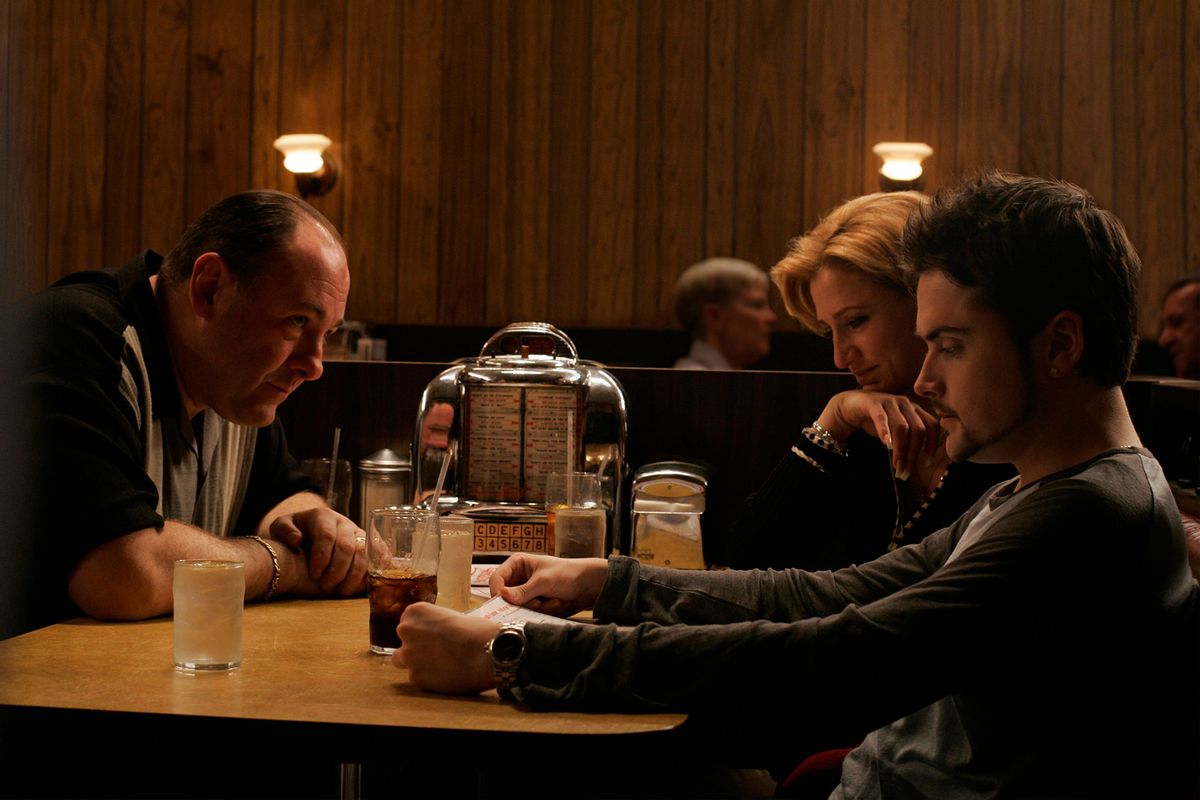On June 10, 2007, less than a month after Jeff Scott Soto’s last performance with Journey, HBO aired the final episode of the popular Mafia TV show "The Sopranos," one of the most celebrated, and debated, endings in television history. Set in northern New Jersey, the series follows a modern-day “godfather,” Tony Soprano, in his travails as the leader of a secondary Italian crime family in decline. While not a comedy per se, much of the plot was comedic, starting with the premise that the lead character would be in treatment with a classic Freudian psychoanalyst (not unlike a contemporary Mafia comedy film, "Analyze This," starring Robert De Niro and Billy Crystal). Over six seasons, the protagonist gets deeper into his own angst even as the world of the American Mafia is fading.
In the final scene, Tony, actively hunted by rival gangs, the Federal Bureau of Investigation, and possibly even members of his own “crew,” sits in a diner in Bloomfield, New Jersey. Joined first by his wife, then by his son, while his daughter struggles with parallel parking outside, various people whose presence seem ominous enter the diner; one of them, in a long-outdated Members Only jacket, heads to the men’s room, in a nod to a murder scene from "The Godfather."
Through it all, Tony’s jukebox selection plays. Thumbing through the options, which include Sawyer Brown’s version of the Oak Ridge Boys’ “Somewhere in the Night,” Heart’s “Who Will You Run To” (written by Diane Warren of Bad English’s “When I See You Smile”), and Tony Bennett’s version of “I’ve Gotta Be Me,” he settles on Journey’s “Don’t Stop Believin’.” The scene concludes to the sound of Steve Perry singing his eighth or ninth “Don’t stop,” and the screen goes black, leaving the viewer to wonder what— if anything—happens next.
The choice of “Don’t Stop Believin’” spoke volumes. "The Sopranos" existed in a postindustrial suburban world. The song had been written for fans like the fictional Tony, the teenagers of the late 1970s and early 1980s, not necessarily future mafiosi but youngsters similarly trying to find their place in a world where the opportunities that had propelled their parents into middle-class jobs seemed to be vanishing. Tony Soprano represented those fans who saw Journey at the Capitol Theater in Passaic, New Jersey, in 1978, rhythmically slapping the stage to demand another encore. Now in middle age, they faced new crises, having abandoned cities like Passaic (or Newark, in Tony’s case) for the suburbs and finding them culturally wanting. The song, like the band that performed it live, appealed to a nostalgia for a mythical time before the concerns and challenges of either adolescence or middle age.
The song, like the band that performed it live, appealed to a nostalgia for a mythical time before the concerns and challenges of either adolescence or middle age.
Watching at home in San Diego, Steve Perry knew what was coming. While the episode was in the final stages of editing, producer David Chase approached him for permission to use the song. Initially the singer refused, “concerned that this could be a finale bloodbath or a [St.] Valentine’s [Day] massacre.” He demanded to be told how the scene would play out, but Chase did not want to let the secret slip; the actors and crew were contractually kept from “spilling the beans,” but Perry was not. Ultimately Perry convinced Chase that he would keep quiet, and the producer relented. Cowriters Neal Schon and Jonathan Cain had already given their permission for the song to be used, and Perry’s permission came on Thursday, June 7, only three days before airtime. Once Perry learned of the ending, he agreed that it was “just perfect” and stayed true to his promise.
The series finale of "The Sopranos" brought Journey once again into the cultural zeitgeist, even as it confirmed their status as a “nostalgia act.” The day before the show aired, “Don’t Stop Believin’” was downloaded on iTunes 1,000 times; the day after, 6,531 times, rising to number 17 for the week. "Journey’s Greatest Hits" “also cracked the Top 20.” And according to Nielsen, radio airplay of the song “increased 192 percent Monday through Thursday over the first four days of the previous week.” Before long “Don’t Stop Believin’” had become “the bestselling digital track from the 20th century,” as one reporter put it, and remains so as of this writing. “Not Michael [Jackson]. Not Bruce [Springsteen]. Not Whitney [Houston]. But the rock band that still has us holding on to that feelin’.”
Schon had taken a big risk firing Jeff Scott Soto, the sort of move he liked to call “ballsy.” But it was his move to make. Herbie and Perry had destroyed each other fighting over the band’s leadership. Herbie’s replacement, Irving Azoff, ran a multiclient organization that provided support for the band’s operations but little guidance or direction.
For better or worse, it was Schon’s band now. And with “Don’t Stop Believin’” featured on the "Sopranos" finale, Journey was more popular than ever.
But without a lead singer, they were dead in the water.



Shares